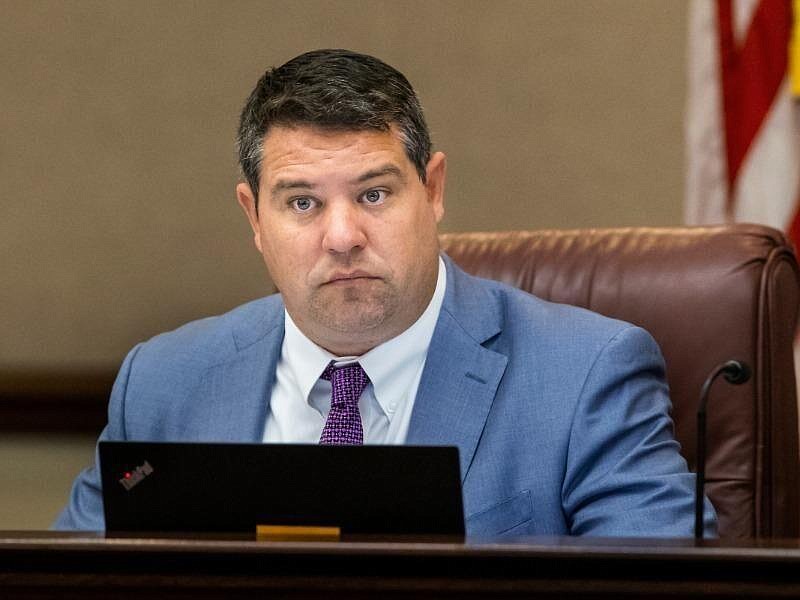- January 15, 2025
-
-
Loading

Loading

The state Senate continued to move forward Thursday, Jan. 20, with a pair of controversial local-government measures that critics contend are tilted too far to businesses and would “embolden bad actors.”
The Appropriations Committee voted 11-7 to back a proposal (SB 620) that would allow businesses to file lawsuits if local ordinances cause at least a 15 percent loss of profits. Meanwhile, the Rules Committee voted 14-2 to approve a revised bill (SB 280) that would require municipal and county governments to craft “economic impact” statements for certain ordinances, which could be paused by legal challenges.
Both bills are now positioned to go to the full Senate.
Sen. Travis Hutson, a St. Augustine Republican who is sponsoring the proposals, said he is trying to end a parade of “preemption” bills that have become a hallmark of recent legislative sessions. Preemption bills involve the state taking away control of issues from local governments.
“Last year, I think we had six or seven preemption bills. I think there's another three or four or five this year,” Hutson said.
Hutson made changes Thursday to SB 620, the more-contentious of the proposals. The changes included limiting the liability of counties or municipalities for business damages to seven years of lost profits and removing a provision that would have allowed businesses to sue because ordinances cause at least a 15 percent loss of revenue. The lawsuits could be based on lost profits.
The measure would apply to businesses that have been operating for at least three years.
Hutson’s proposal would also allow local governments to make changes to ordinances to help fend off potential lawsuits. Certain land development regulations, building codes, fire codes and debt financing changes would not factor into business damage claims.
Joining Democrats in voting against the measure, Sen. Jeff Brandes, R-St. Petersburg, said the proposal could bankrupt some small cities and counties.
“This is a Luddite bill,” Brandes said. “This bill holds us in stasis.”
Rebecca O'Hara, senior legislative advocate for the Florida League of Cities, said that if the bill was in place 20 years ago, local governments would have not been able to address the explosion of “pill mills.”
“Human trafficking, internet cafes, liquor stores, puppy mills, panhandling, short term rentals, medical marijuana treatment centers, all of these things will be fair game for business-damages claims if local governments are trying to address those activities, even in circumstances where you have specifically authorized local governments to act,” she said.
Hutson said local officials have the ability to factor in the economic impacts of addressing establishments that cause nuisances.
“There may be times where doing something to the business is a greater public interest and it’s worth making that decision even if it does cost them some of their revenue dollars to make that business whole,” Hutson said.
When asked why the bill doesn’t impose the restrictions on state government, Huston replied he’d support such a proposal.
“I’m certainly open to that discussion,” Hutson said. “I don't think our state is going to do anything to intentionally hurt business.”
The bill is modeled after a longstanding state law known as the Bert J. Harris Private Property Rights Protection Act, which allows property owners to file lawsuits if government decisions have “inordinately burdened” property use.
Meanwhile, local government groups backed changes to the proposal (SB 280) related to economic impact statements.
Hutson amended the proposal at the Rules Committee to allow impact estimates to be prepared by outside groups rather than staff. Among other things, the changes removed the need for impact statements for ordinances dealing with growth management, emergency relief, taxation and constitutional officers.
“This bill does not tell an elected official to vote yes or no,” Hutson said. “What it does is it gives them more information. They all have staff analysis at the local level that talk about everything they do before they vote. We’re just adding a fiscal impact statement to that staff analysis.”
O'Hara said the changes address about 80 percent of the concerns raised by the bill.
“I think it's worth noting that the scope of the bill has been reduced to minimize the potential fiscal impact as much as possible,” O’Hara said. “That's not to say that it doesn't exist. It has been addressed in the form of providing various exemptions to the requirements that will also help narrow the scope of the bill.”
Still, concerns remained.
David Cullen, a lobbyist for the Sierra Club Florida, said the changes take the rough edges off the measure, but the overall proposal puts business concerns over all other parties.
“It is pro-business to the point where it will be detrimental to communities and their quality of life,” Cullen said. “It's chilling effect will only embolden bad actors.”
Florida AFL-CIO lobbyist Rich Templin said there is another way to stop preemption bills. “Don’t file them,” Templin said.
“You are deputizing individuals to conduct preemptions,” Templin said. “Individuals, not lawmakers, nobody elected by anybody is going to be able to file suit to put a halt to an ordinance.”